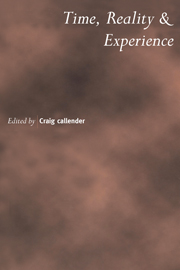Book contents
- Frontmatter
- Contents
- Preface
- Notes on Contributors
- When Time Gets Off Track
- Burbury's Last Case: The Mystery of the Entropic Arrow
- Zeno's Arrow and the Significance of the Present
- Presentism, Ontology and Temporal Experience
- A Presentist's Refutation of Mellor's McTaggart
- Time and Degrees of Existence: A Theory of ‘Degree Presentism’
- McTaggart and the Truth about Time
- On Absolute Becoming and the Myth of Passage
- Time Travel and Modern Physics
- Freedom from the Inside Out
- On Stages, Worms and Relativity
- On Becoming, Cosmic Time and Rotating Universes
- How Relativity Contradicts Presentism
- Can Physics Coherently Deny the Reality of Time?
- Rememberances, Mementos, and Time-Capsules
Freedom from the Inside Out
Published online by Cambridge University Press: 05 May 2010
- Frontmatter
- Contents
- Preface
- Notes on Contributors
- When Time Gets Off Track
- Burbury's Last Case: The Mystery of the Entropic Arrow
- Zeno's Arrow and the Significance of the Present
- Presentism, Ontology and Temporal Experience
- A Presentist's Refutation of Mellor's McTaggart
- Time and Degrees of Existence: A Theory of ‘Degree Presentism’
- McTaggart and the Truth about Time
- On Absolute Becoming and the Myth of Passage
- Time Travel and Modern Physics
- Freedom from the Inside Out
- On Stages, Worms and Relativity
- On Becoming, Cosmic Time and Rotating Universes
- How Relativity Contradicts Presentism
- Can Physics Coherently Deny the Reality of Time?
- Rememberances, Mementos, and Time-Capsules
Summary
Introduction
Since the death of strong reductionism, philosophers of science have expanded the horizons of their understandings of the physical, mental, and social worlds, and the complex relations among them. To give one interesting example, John Dupré has endorsed a notion of downward causation: ‘higher-level’ events causing events at a ‘lower’ ontological level. For example, my intention to type the letter ‘t’ causes the particular motions experienced by all the atoms in my left forefinger as I type it. The proper explanation of the motions of an atom at the tip of my forefinger primarily involves my intentions, rather than (for example) the immediately preceding motions of other nearby atoms, or any other such particle-level events.
While this is a natural enough idea on the face of it, such downward causation has seemed to be in tension, or outright conflict, with another compelling intuition, which Dupré calls causal completeness.
‘This is the assumption that for every event there is a complete causal story to account for its occurrence. Obviously enough, this is a view of causality the roots of which are to be found in the soil of determinism. The paradigm of a complete causal story is the sufficient (and perhaps even necessary) antecedent condition provided by a deterministic causal explanation. However … [since microphysics seems likely to be indeterministic], it is important to consider theindeterministic analogue of deterministic causal completeness. […]
- Type
- Chapter
- Information
- Time, Reality and Experience , pp. 201 - 222Publisher: Cambridge University PressPrint publication year: 2002
- 6
- Cited by



